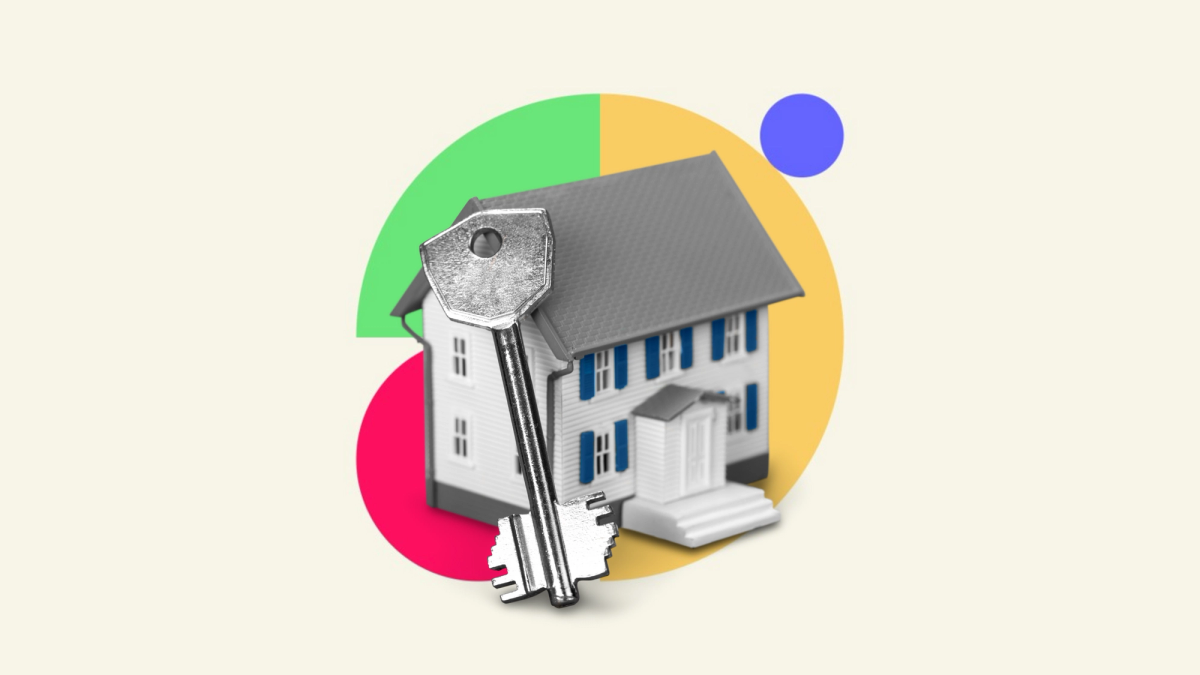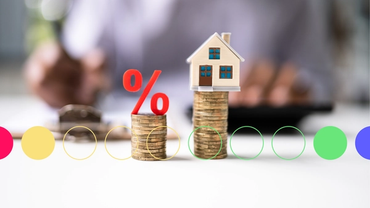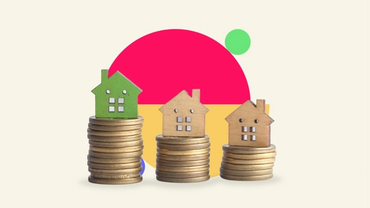How to save for your first property
By Boring Money
25 Mar, 2025
Buying a house is exciting! Making your first few steps onto the property ladder is a momentous occasion in many peoples' lives and is often one of the biggest financial decisions we make. However, getting to that point can be stressful too and can at times feel like a pipedream. In this article, we explain how to get started, from understanding your budget to getting help with saving up your deposit.

1. Know what you're aiming for
The first and perhaps most important step in your journey to homeownership is to understand what sort of property you intend to buy. Everyone's needs and expectations are different.
For example, if you're a single professional in London then you might be looking for a one-bed flat with an easy commute into the City, but a young family might prefer a three-bed semi-detached property in a good school catchment area.
It's worth taking a step back and thinking about the type of property you want to buy before you dive into any calculations, as this will help you to narrow down your search and eventually get a better sense of the price that you're likely to pay.
It's also crucial at this stage to understand how much you might be able to borrow as a mortgage. As a general rule of thumb, most lenders will allow individuals to borrow a mortgage worth 4.5x their annual salary. Some stretch this to 5x. Couples buying together can also borrow a multiple of their combined income, although this is usually lower than the 4.5x figure for individual buyers.
The government's MoneyHelper service has a handy mortgage affordability calculator which can help to give you an estimate of the size of mortgage you might be eligible for.
Once you've got a better understanding of your property goals and borrowing capacity, start to do some research and find out how much your ideal home could cost. You can browse online estate agents, like Rightmove or Zoopla.
Search for properties in the areas you'd like to live with features that are important to you, e.g. two bedrooms or more, a garden, or near to a railway station.
This will help you to understand the range of prices you can expect and then you can calculate what your deposit might need to be. This is the amount you'll need to pay upfront in order to secure a mortgage and buy the property, and generally speaking, it's a big chunk of money for anyone to save.
2. Start saving for your deposit
In England, the average deposit for a first-time buyer in 2023 was £53,414[1] - no small sum. The amount varies across the UK, and while lower in areas such as Wales, is reportedly as high as £108,848 in London!
Region | Average deposit |
England | £53,414 |
Scotland | £39,691 |
Wales | £36,350 |
Northern Ireland | £31,948 |
London | £108,848 |
Source: uSwitch, May 2024
Using your research from step one, you can start to reasonably estimate how much you might need to save up as a deposit.
The size of deposit you need to save can differ depending on a number of factors, such as the value of the property, but typically ranges from 5-20% for people buying their first home. There are even a handful of mortgages which don't require any deposit at all, though these are few and far between and the eligibility criteria is very strict.
The bigger the deposit you can save, the better. This is because the more money you're able to pay upfront, the less you'll have to borrow from the bank as part of your mortgage. This in turn means that your monthly repayments are likely to be lower as you have less debt overall to pay back.
So while saving a 5% deposit might feel like a more achievable goal than saving up 20%, it could mean that you'll be saddled with higher monthly mortgage repayments than if you held on for longer and saved more.
3. Get help to save for your first home
You can see from the examples above that a deposit can be a rather huge amount of money, and even if you're saving as part of a couple, it can feel daunting to think how much you'll need to save.
Fortunately - apart from good old-fashioned, rigorous saving - there are a couple of options out there that can help you get to this stage a little quicker. Here's a breakdown of the two main ways you can get help with saving for your first property.
Lifetime ISA
A Lifetime ISA (also called a 'LISA') can greatly boost your deposit savings. If you’re aged between 18 and 39, a Lifetime ISA allows you to save up to £4,000 a year and get a free 25% top-up from the government. That's a bonus of up to £1,000 every year!
There are a few Ts and Cs, such as maximum property prices and exit penalties to be aware of, but a Lifetime ISA is a worthwhile investment for many who are struggling to save for their first home.
Contributing towards a Lifetime ISA (LISA), which is specifically geared up for house deposit or retirement savings, can reduce the time it takes a young person to purchase their first home as the account comes with generous tax benefits. Like other ISAs, any income or capital growth within the LISA is shielded from income tax, capital gains tax and dividend tax but there are a number of tricky rules to navigate that can deliver a sting in the tail for young people if they don't use the LISA in the right way.
Let's say you opened one at the age of 20 and saved the maximum of £4,000 a year (thus receiving a £1,000 government bonus on top as well). By the time you're 30, you'd have saved £50,000 (10 x £5,000). You can read more about Lifetime ISAs, the eligibility rules and the pros and cons of using them to buy your first property in our full guide below.
Shared ownership
Shared ownership schemes allow you to purchase part of a new-build property and pay rent to a landlord on the remaining amount. The amount you can initially buy is typically between 25-75% but can occasionally be as low as 10%. The more of the property you own outright, the lower your rental payments will be.
Fortunately, you can buy more of the property at a later date in a process called 'staircasing'. However, as well as the upfront amount and the rental payments, there are typically other fees such as ground rent or service charges to pay as well.
You can apply for a shared ownership property with savings or you can take out a mortgage to fund the purchase, so it can be a useful way of getting on the property ladder with a lower initial deposit, but remember that you could end up with mortgage repayments, rent and other service charges to pay on a monthly basis. So it's not for everyone. You can read more about how shared ownership works on the HMRC website below.
4. Consistency is key
When you're saving up to buy your first property, discipline and consistency are your best friends. That is to say that building up your deposit involves setting money aside in savings - often at the expense of spending in the here and now.
Some will be super dedicated and might have set a personal goal, such as to buy their first property by the time they're 30, which can help to give their savings some momentum. Others might be happier to save at a more comfortable rate as their current lifestyle is working quite well for them.
It's down to you. And, as it's your own property you're saving for, you only have to answer to yourself. Understanding your budget, being consistent and setting up a regular savings plan can help you to take meaningful steps at a pace that's manageable for you.
For example, let's say you've got a Lifetime ISA and you want to max out the £4,000 allowance every year so you can get the £1,000 bonus from the government. £4,000 over the course of 12 months amounts to around £333 a month, so you might decide to set up a £333 direct debit from your current account into your LISA the day after you get paid every month to achieve this goal.
It helps to automate the process where you can so you don't need to faff around making the calculations every time.
5. Make yourself an attractive borrower
And finally, while you're saving up your deposit, it can be tempting to think that you're 100% guaranteed to get a mortgage if you have enough money. However, lenders take a number of factors into account when deciding whether or not to approve your mortgage application.
Your credit history - or credit 'rating' or 'score' as determined by different credit reference agencies - is checked by banks or lenders when you make a mortgage application to help them decide whether it's sensible to lend you money.
In other words, is it wise for them to lend you a mortgage worth hundreds of thousands of pounds, or do you have a history of not paying back debt or struggling to keep with regular payments? If so, your chosen lender may feel less inclined to approve your mortgage application as you're more likely to not be able to fulfil your end of the contract.
Building up a good credit score involves demonstrating to lenders that you're responsible with money. This can mean owning and using a credit card to show that you're able to be trusted with credit. It can also involve things like making sure you're on the electoral register at your current address, keeping all your contact details correct and up to date at all times, and paying any loans or debts back on time in full.
Developing a good credit history, or repairing it if it's not very good, is not an overnight process and usually takes months and even years to cultivate. You can read more about how to improve your score as you prepare to apply for a mortgage in our handy guide below.
Best Lifetime ISA providers
If you're starting out on your homeownership journey and you're considering opening a LISA to get you there, why not discover our top picks?
The winners of our coveted Best Buy LISA awards are selected using a combination of thousands of real customer reviews and our rigorous behind-the-scenes testing with live accounts.
We consider everything from charges for the smaller accounts we normally see in Lifetime ISAs to customer service and ease of use to bring you the very best LISAs on the market in 2025.
---



